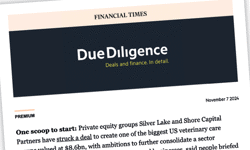Years ago, the legendary Sun editor Kelvin MacKenzie offered up the weather forecast in Norwegian when he ventured into television with his L!ve TV channel.
It was one of a number of elaborate jokes – topless darts was another - in MacKenzie’s short-lived channel.
The Norwegian lesson
But the recent experience of Norwegian newspapers could provide a much more serious template, at least in part, for David Montgomery’s Local World, the venture that brings together the 110 titles of DMGT’s Northcliffe Newspapers and Yattendon’s Iliffe News and Media.
The papers involved, Norway’s Edda Media group, which was sold earlier this year, was a strong performer in Mecom, the struggling European newspaper group founded by Montgomery.
Even though Montgomery was ousted from Mecom nearly three years ago under shareholder pressure, he travelled to Norway in December to see how the Norwegian titles were faring after a period of transition to the digital world.
He had a particular reason for wanting to update his knowledge. Two days later, he was addressing all the editors and managing directors of Local World and setting out his vision for a new model for the local newspaper publishing industry, which he hopes, will help to resuscitate the sector.
“From a standing start in January 2010, the Norwegians have now got an equal number of online users as they have print readers. Local World is certainly learning lessons from what has worked in Scandinavia and Norway in particular but of course, Norway is a very different place,” says Montgomery.
In three years, the papers there have gone from a declining print readership to a net gain of 30 per cent in total audience when you add print and online together.
It proves to Montgomery that when you get the balance right between print and digital, you can grow your audience.
The best performing of the Norwegian titles are now also seeing an increase in print circulation while 20 per cent of revenues comes from online advertising, a higher percentage than is general in the UK.
“The heartening news from Norway is that I think we can forget any threat from online. The better you do online, the better your paper becomes in reality because you harmonise the two,” says Montgomery, whose ambitions include finding a way to underpin the economics of print.
“You have constant cross-promotion and you make content appropriate to the paper and appropriate for online and when people work across platforms, they become very sensitive as to what content is best for what platform,” adds Montgomery who has more than 40 years’ experience in the newspaper industry.
Community based
There is another aspect of Norwegian newspapers which he hopes to emulate in Local World – their relentless localness and the way they reflect the essence of their communities.
On a recent trip, Montgomery picked up a copy of one of the 16 regional dailies involved in the Local World deal, the name of which he declines to reveal. The lead was an interesting but relatively minor crime story. But what struck him most about the paper was how little it seemed to reflect the character of what was a very distinctive city.
“If you look at the Norwegian online sites, you will in some cases be able to smell the salt air – the characteristic community is built around fishing tradition, or farming or technology traditions,” the chairman of Local World says.
“You sense there is a community there and the old news agenda dictated by news editors the length and breadth of newspapers is not relevant anymore,” Montgomery insists.
Ask Montgomery when he first got the idea for Local World and he suggests it was 40 years ago and laughs.
Certainly, he was already talking three years ago about the need for a radical vision for the future of newspapers, starting again with a blank sheet of paper.
On the staff, you would have journalists carrying out a much wider and more flexible range of functions than has traditionally been the case and people to sell local advertising and that would be it. Every other service would be farmed out to third party suppliers. The local newspaper would be the publishing hub for every kind of local information disseminated on every relevant platform.
Those ideas discussed three years ago are now at the heart of Local World.
The need for a fresh start, Montgomery argues, has been there for years.
First, publishers tried to defend print by almost ignoring the other platforms and then they went for cost-cutting. The twin targets of efficiency and productivity, Montgomery believes, must be the aim and could lead to extra investment in editorial.
“No one really did things much differently. The need has been to start with a clean sheet of paper and that means leaving behind the industrial baggage,” he insists.
“Our starting point in Local World is we have no presses whatsoever and ultimately, our ambition is to be a pure content and commerce business and that once a year, we write a cheque to a provider of all the services you need to continue to produce print,” he newspaper executive adds.
The former chief executive of the Mirror Group must have been very persuasive about his vision to talk Daily Mail and General Trust into handing over Northcliffe Newspapers for a 38.7 per cent stake in the enlarged venture plus a £52.5 million up-front payment. Seven years ago, DMGT were looking, unsuccessfully, for £1.2 billion for the regional group – albeit it in very different circumstances. Yattendon will own 21.3 per cent of the new company and Trinity has paid £14.2 million for a 20 per cent stake. No Trinity titles are in the Local World venture but there is likely to be close collaboration and Trinity already prints a number of the Montgomery papers.
The aim: audience growth
The vision that Montgomery has sold publishers and other investors is that if you get it right, you can grow your local audience and your market penetration then increases and no one but local publishers can do that – certainly not a Google or an Amazon he believes.
“You have got to show that you have more than just a dwindling print audience. You have to demonstrate that you can build an audience and also segment that audience. There is no point in just growing audience for the sake of it,” explains Montgomery, who will work closely with Local World chief executive, Steve Auckland.
For the Local World non-executive chairman, the bad news is that journalists and editors have lost control of the audience thanks to mobile, online technology and social media.
“The good news is they can manage that relationship (with the consumer) very effectively if they are prepared to manage content and lots of content that comes from the community itself and that is the really significant shift that we have got to make,” Montgomery says.
In this new world, you can forget sub-editors in the conventional sense and even editors become “pretty redundant” as people who make decisions on matters of taste or what the page three lead will be.
“The editor title will survive but the job has to be much broader and comprehensive. The modern editor will be the content director, managing content, organising content and disseminating it on the appropriate platform; print, online or mobile,” says Montgomery.
And there will be an unprecedented amount of content and, naturally, journalists will have to take responsibility not only for their own work but other people’s content as well.
20-fold increase in content
Montgomery is trying to do something quite radical – changing the philosophy of what local journalism or local content is.
“It’s about getting people to organise themselves sufficiently to manage the amount of content a local publisher exploits. Not a two fold increase but a 20-fold increase in the amount of content a local publisher exploits,” the Local World chairman insists.
But isn’t managing a 20-fold increase in content, most of it coming from the community itself, an impossible burden to place on journalists?
The hard work can be turned into light work, Montgomery believes, if it is properly organised and managed, turning local publishers into the one-stop-shop for local content.
He clearly sees his vision being turned into reality by an elite force of highly productive and better-rewarded journalists who will, at the same time, be relieved of some of the drudgery of the present job.
Montgomery thinks the economic challenges facing the local and regional press are now so great that there is a changed mood in the industry. There is a realisation, coming party from changed management at the top of a number of newspaper groups, that fighting each other or the Competition Commission is pointless and that the industry needs to collaborate and re-organise.
“There is a turning point here. I think the industry has decided to get together to try to secure the future and all the old-fashioned rivalries have disappeared,” says Montgomery.
Certainly the local newspaper industry in general and Trinity Mirror in particular, will be watching to see whether Montgomery’s bold experiment with a blank sheet of paper is a way forward for the industry.
Others might be welcome to join in future although, for now, Montgomery says he has “more than enough to chew on”.
For the first year at least, the aim will be to increase the size of the overall audience and then exploit the hoped-for growth with increased ad sales.
In future, some pay elements could be included but, for now, audience growth is the prime target for Local World.
The remaining mystery is why Montgomery, who is 64 and has made enough money to pay for a comfortable retirement, is taking on such a difficult and unpredictable task.
“The newspaper industry is a much more exciting and stimulating world than when I started, and challenging and multi-faceted, and the opportunities are just immense to create a different sort of business. It is the most exciting time in our media lifetimes. How could you possibly be left out of that,” says David Montgomery.












